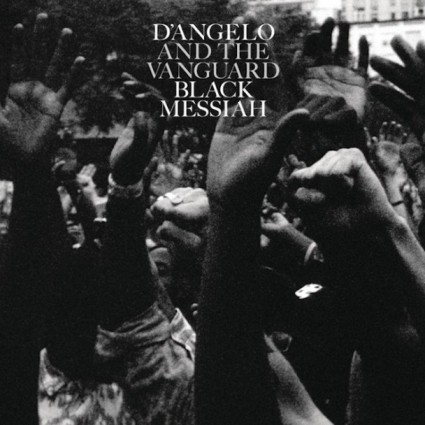D’Angelo and The Vanguard | Black Messiah
D’Angelo and The Vanguard | Black Messiah
By Peggy Oliver
It’s been awhile – maybe a little longer than awhile. Alright, how about summing up D’Angelo’s fifteen-year return to the recording fold by quoting from L.L. Cool J’s larger than life rap classic, “Don’t call it a comeback.” Yet, despite a fourteen years recording absence since D’Angelo waxed Voodoo in 2000, do not mistake the fact that his career path falls more into the sabbatical mode, as he took a break for five years between the aforementioned sessions of his major commercial successes, his 1995 introduction, Brown Sugar (including the smash title track and “Lady”) and Voodoo (“Feel Like Makin’ Love” and “Untitled (How Does It Feel)”). When the music industry last heard from D’Angelo, he was blowing up big time at the height of the neo-soul world during the mid-nineties as a genius production architect and musical visionary.
After completing a tour to support Voodoo, D’Angelo was rarely seen or heard from, though he kept his vocal feet wet with a few collaborations along the way with Common, J. Dilla and Roy Hargrove, and participating on the Red, Hot & Riot compilation with Macy Gray, Hargrove and others for the Fela Kuti classic, “Water No Get Enemy.” Supposedly, the launching of D’Angelo’s third solo effort that began in 2009 was delayed for numerous and sundry reasons, though he did preview some of his newer pieces during several 2012 live appearances, which eventually made their way to the end of another sabbatical in Black Messiah.
For those who might have anticipated the old D’Angelo guard, several traces of the glory days of Brown Sugar and Voodoo remain. But Black Messiah finds a more-forward thinking D’Angelo progressing into a deeper, sometimes abstract funk, rock and hip-hop plain that replaces the smoother neo-soul jazzy lines, executed with passionately raw live instrumentation courtesy of his current musical collective, The Vanguard. It is indeed that these top-notch players (including Pino Palladino and Jesse Johnson) should receive equal billing since they receive more than their fair share of jam time.
While D’Angelo’s forward thinking orchestrations dominate Black Messiah, the grooves are still very much evident. “Sugah Daddy” hypnotizes with that tap-dance foundation, tantalizing piano bridges, screeching brass, funky guitar and D’Angelo’s sometimes garbled vocals and scat leading the way. The first single, “Really Love,” evolves from a steamy flamingo guitar and sultry female vocal into D’Angelo’s back in the day neo-soulful strut. “Betray My Heart” is wrapped in brass flutters and guitar struts, framed masterfully with rolling bass guitar and tick-tock snares. While the ardent grooves are certainly indisputable, Black Messiah’s left-of-center expressions reflect D’Angelo’s risks to avoid being trapped in an urban mainstream box.
Distorted guitars swim amongst the synthesizers on the self-explanatory, “Prayer“: “You got to pray all the way.” “1000 Deaths” rattles the senses with in your face sample of a fire and brimstone sermon about Jesus, “the revolutionary Savior,” accompanied by the constant hammering of bass, guitars, synthesizers and D’Angelo’s distorted voice. From the high rock dosage of “1000 Deaths” to stripped-down blues, “The Door” sets the tone with a chorus of whistling and offers a sharp slide guitar solo.
The media buzz surrounding Black Messiah is beyond measure, most of it quite good. Perhaps a lengthy sabbatical, in this case for D’Angelo, does not necessarily mean an artist kiss of death. Four and three-quarter stars.
Peggy Oliver
The Urban Music Scene
